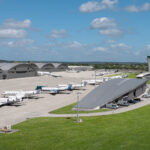Aerospace innovator Honeywell announced a significant milestone this week with confirmation that its Advanced Air Mobility (AAM) business unit has secured contracts worth over $10 billion.
Since its formation just over three years ago, the unit has developed vital partnerships with industry leaders such as Archer Aviation, Lilium, Pipistrel, Supernal and Vertical Aerospace.
“Those are key customers that we believe are critical to moving this market forward,” said Taylor Alberstadt, senior director for global sales and marketing within the Advanced Air Mobility (AAM) unit at Honeywell.
Honeywell was an early adopter within the AAM industry, having started the dedicated business unit at the start of 2020.
This has given Honeywell the edge with AAM OEMs and enabled it to grow to the $10bn figure today. “We’re acting entrepreneurially, we’re thinking differently, we’re able to talk the language of startups and be able to sit at the table with them and say we understand your issues,” said Alberstadt in an interview with FINN from the Dubai Airshow 2023.
“Over the last three and a half years, we’ve grown the business unit to over 50 people. We have very strong relationships, we have announced awards with customers, we have programmes that are very rapidly maturing, and we’re still looking very much towards the future, identifying new potential players.
“None of that would be possible if we didn’t have the foresight to say this is a place we really want to play. It’s an area that we’re really excited about, and that’s paid off since the inception of this business group.”
Honeywell has a comprehensive product portfolio within the AAM sector. This features an electronic solutions business, including avionics and flight controls, mechanical systems and components, engines, power system and electric propulsion and services and connectivity.
Honeywell: brains, muscles and senses
The offerings, based on generations of experience across all sectors of aerospace, act as the brains, muscles and senses of soon-to-be-launch AAM aircraft.
Central to this is Honeywell’s flight control computer technology. “It is such a powerful tool for the Advanced Air Mobility industry,” said Alberstadt.
“A design where you may have up to 30 different propellers and engines, you can’t pilot that anymore. Nobody is going to individually control each of those effectors and rotors.
“The only way you’re able to do that is by having the brains of the vehicle, which is the flight control computer. Without the brain of the aircraft, you wouldn’t have the ability to bring these vehicles to market in a certified way.”
Crucially, Honeywell has been able to “miniaturise the brain” to make it appropriate for AAM vehicles.
The research and development work that is taking place within the AAM sphere will also benefit the wider general, business and commercial aviation sectors.
Alberstadt said AAM was the “perfect sandbox to test out and prove the technology that we expect to be building blocks that will scale right up to the airliners”.
He added: “If we can make it smaller, lighter, smarter, why wouldn’t that be deployed in other places.”
Ground control station technology
One area that Honeywell is committing time and resources to is the ground control station technology that will be key to enabling AAM flight through centralised command centres.
“When we think about how remotely piloted or autonomous vehicles will be monitored from the ground, our team is looking at how you do that from a software and hardware point of view,” he said.
Autonomy is another area that Honeywell is looking at with increasing interest.
“This industry [AAM] is the one really pushing the envelope on autonomy,” he said. “We need to understand exactly what a pilot does today and which of those [functions] we can move from the pilot to the machine in a way that we’re reducing workload, but keeping the same – or improving – level of safety associated with operating that vehicle.”
Honeywell is also prioritising the long-term growth of the AAM industry. Through initiatives like hosting industry summits in Washington, DC, the company brings together regulators, original equipment manufacturers and members of Congress to catalyse dialogue and action.
Ultimately, the aim for Honeywell is to promote an AAM industry that is clean, safe and efficient.
“We’re adding a quieter, cleaner, greener, safer and more cost effective modality to transportation,” Alberstadt said. “This is a radically different, positive change to transportation.”
Subscribe to the FINN weekly newsletter

